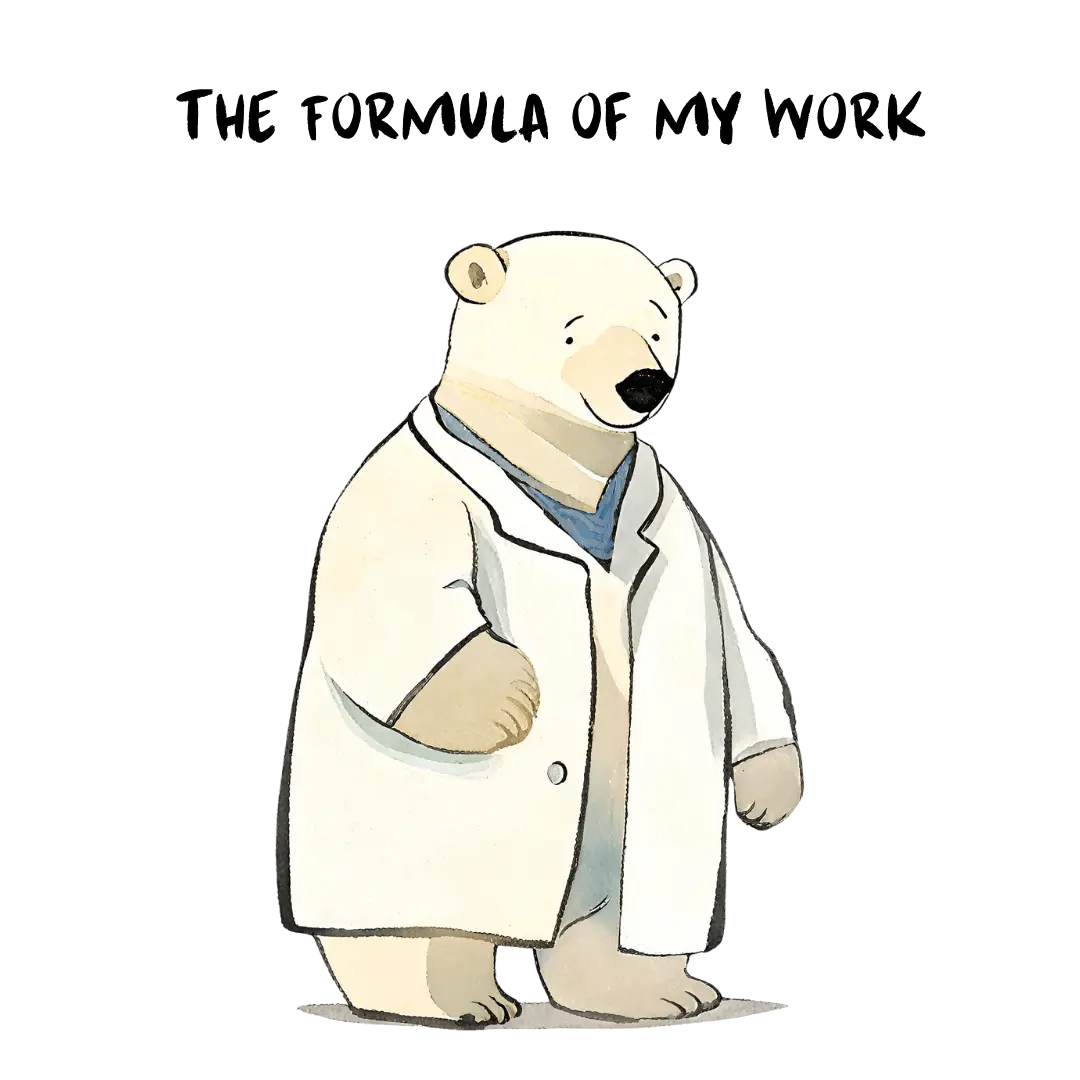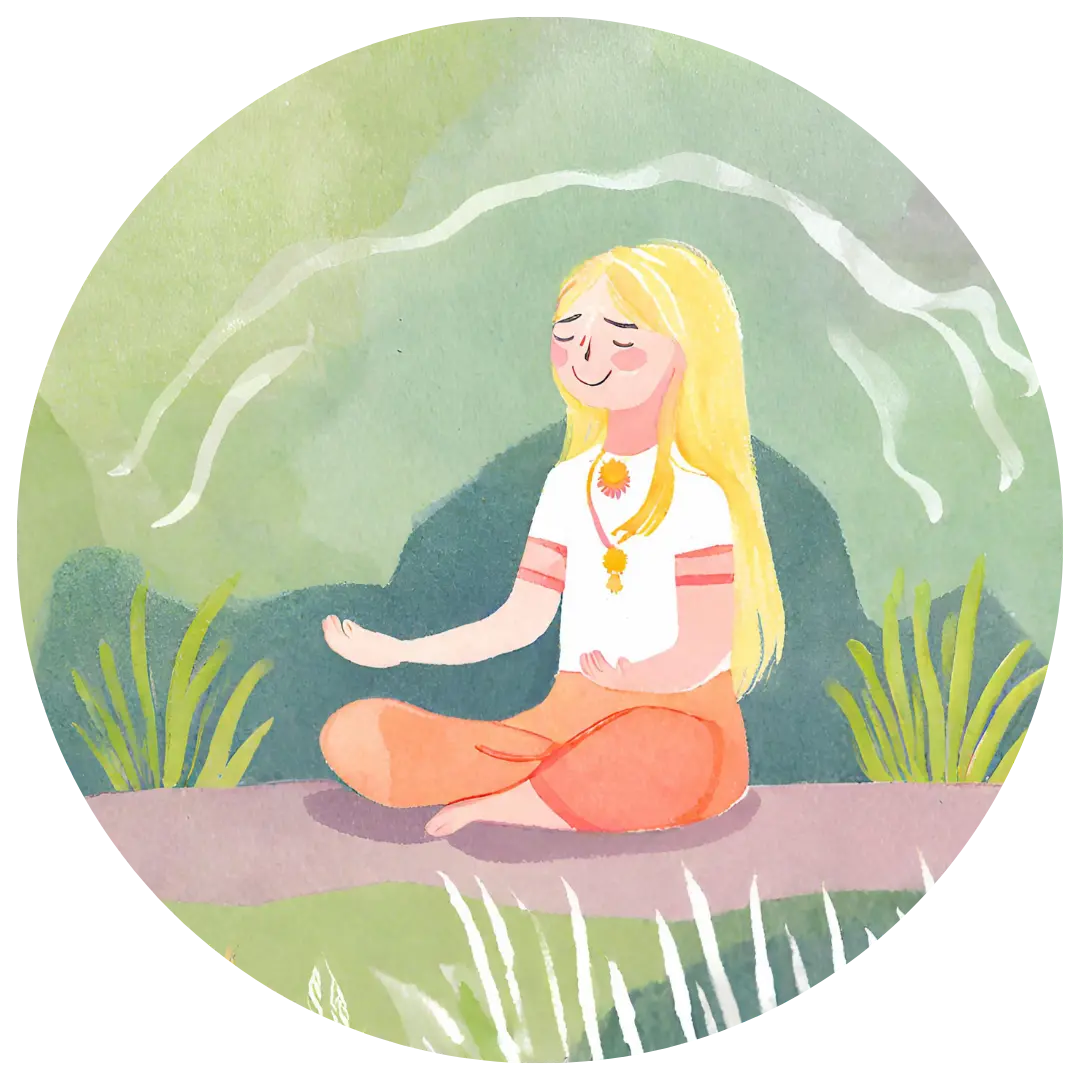
My work is a combination of an approach called solution-focus and applied neuroscience for well-being, performance, and goal attainment. I call it a formula as it combines ideas and science that dance together. It’s a fluid formula though, as it shapes around your desired outcome while following a few essential principles. There is no standard script for my work, only ingredients that can create personalized outcomes and that’s why it is fun. Honestly, You are the essence of this formula! While I bring skills and knowledge - You are the expert of your life and have skills and resources that mean everything. Besides knowing the approach to coaching, I also know why and how it works. Being trained as a coach directly by neuroscientist I bring tools and ways of conversation that works.
Why am I showing this formula to you?
I care that my clients create their preferred outcomes and I believe that you will benefit the most by understanding how and why these sessions work. You can use these ideas outside of the coaching sessions - in your life, with family, friends, colleagues.
More details, along with useful tips and coaching questions you can find in the resources.
The key elements of every coaching session:
Warm up – getting our resourcefulness activated. We will always explore positive things that happened to you in the beginning of our conversation. Even in the darkest times, there is a glimpse of happiness, hope, gratitude. Our ability to recognize and honor that is essential for creating the kind of tomorrow that we want for ourselves. If resourcefulness is difficult to access relaxation practice is optional, either guided or done by the client prior to session.
Focus – I encourage you to invite a moment of focus on presence, so that you can achieve the best results. That can be done either in the session or prior to session by yourself. Tips on how to do it provided.
What **is your preferred outcome from us talking? **An outcome is always formulated in the positive. We may form a long-term goal in the beginning and a goal for each session as we go along the way. It is important to define what it is that you want to achieve from us talking and how will you know you got what you wanted after each session ends? Goals can always be changed if they are no longer relevant.
Meaning of the outcome. Why it matters? This will always be a question we need to repeat again, even if discussed before. For our brain to make any changes it needs relevance – why even bother? Everything takes energy, so our brain is selective where to put it, exploring relevance is a non-negotiable ingredient for success. Don’t be surprised, you may also change your mind about your goal and choose something else to work on.
Experience of the presence of the desired outcome. New ideas and solutions cannot be squeezed out with our hard, rational thinking. Transformation happens from inspiration, not rational thinking. When we experience the preferred outcome by visualizing it in detail and living it in our minds-eye, we create a positive experience and a different context in our brain, this way we invite our subconscious to work in ways that are not otherwise accessible without that experience.
Invite You to reflect on what unfolds during the session. The session is about you and your awareness, it’s never about what the coach thinks. Some questions I ask are unusual, so it can feel hard at times to find the answers. You will always have space to think. Partnering together is very important and coaching is a journey of two, be ready in a coaching session - you get to do most of the talking.
Invite You to look at actions, behaviors, commitment that needs to show up to support the goal. This comes solely from you, as a coach I will not offer an action plan or suggest solutions.

Solution Focused (SF) Approach to coaching
Solution-focus is an approach that initially was developed in psychotherapy in late 70s by Steve de Shazer and Insoo Kim Berg and today is widely used in therapy, hypnotherapy, coaching, as well in organizations and schools. It is evidence-based approach, that is researched to be effective in various cultures and for various problems. It is a fast-working approach and is also called brief coaching, however it is not a “band aid” approach to problems - solution focused conversation grows into the roots of positive meaning that makes solutions last.
Strengths-based – Collaborative - Culturally sensitive – Positive – Empowering - Action-oriented - Giving fast and lasting results - Future-oriented.

Some of key SF principles:
- People are resourceful and capable of solving their problems as well as creating an outcome they want.
- Focus on moving towards what you want rather than trying to fight the problem.
- There is always something that already works well, how to invite more of it?
- Knowing about self-care is powerful when it leads into action.
I like to share Dr. Haesun Moon DOQ model that explains how solution focused approach can be used in conversations, take a look.
Key ideas I focus on in my work with you

Trust. This is a relationship that requires mutual trust. There is a common
belief that coaching is not for personal stuff, but coaching doesn’t
work if we are swimming on the surface. There is always a connection
between why we do the things we do and why something matters to us. As a
coach, I will never ask about your past difficulties as this is a work
of a therapist, but the values and meaning exploration as well as
exploration of a bigger picture of impact is how coaching conversation
grows. It grows into roots, deeper into the meaning.
You are an expert of You. This is the core idea of our coaching relationship - as my client and as a human being you know yourself best and what is important to you. Even if consulting and educational element is invited into our partnering, you as my client are always an expert of what works best for You and what are your best solutions. That is always honored through our professional relationship.

Coach mindset - I don’t hold the answers. When entering our conversation it is essential for me to keep my mind open as if “I don’t know” what is best solution for my client, what my client thinks and feels, I do not assume, instead I am curious. We as human beings could not possibly genuinely listen to what another person says and listen deeply if we think we already come with an answer. Holding an answer for my client is a bias in coaching dialogue that stops from curating conversation and reaching higher potential.

Fixing a problem is a limited possibility, instead aim for your preferred future. In my sessions we acknowledge the difficulties and from there we focus on what you Want instead of what you Don’t want. Our brain doesn’t know how to work with an absence of things. If you didn’t have this problem, what do you want instead of it? I am not trained in any analysis of past problems and some of my clients may decide they need a therapy instead, where they can be assisted with analysis of the problem.

Progress is not only about the future. We often forget to appreciate the resourceful past and the present. Thinking about progress as only in the future - implies that “now is not good enough” and this is not a resourceful mental state for growth. Feeling resourceful in this moment activates the best ideas for the future and opens doors you didn’t know existed. Since you began your journey, what have you learned so far? Honor that.

Change is inevitable. We change all the time, the world changes all the time, so thinking that we cannot create change is far from the truth. I believe that my clients will create the change they want, no matter how big or small, sometimes it’s only a change in perspective. Even though we cannot change the events of the past, we can transform our experience about it and create a better future.
Applied Neuroscience in coaching conversations
The idea of neuroscience in coaching is being used a lot, it is a very attractive idea, but often it doesn’t promise accuracy and usefulness of the information. There are many neuroscience myths that have been flying around in the coaching world and even coaching schools, but appealing metaphors are not always helpful if they are too far from the truth. I take it seriously and offer only what is taught to me directly by neuroscientists as evidence-based information and tools. I took training offered by a well know neuroscientist, author and speaker Dr. Sarah McKay and I appreciate the possibility of bringing what is trusted and safe to you. Besides this, you can read about other minds that inspired me here. As part of my service, I consult about neuroscience tools and some of them you can find in the resources. When it comes to coaching, knowing what in conversation of the session works well, makes a difference, it also means knowing essentials how our brain and minds work. Don’t get me wrong though, I am not a neuroscientist, I am only trained by a neuroscientist as a coach. One of the model I use was initially offered by Dr. Sarah McKay and she calls it “Top-down, Bottom-up, Outside-In”. Check out what it has here.
My work is inspired by other minds
To create a human mind we need many brains - Lisa Feldman Barrett
There are many great minds that inspired me, but these are at the heart of my work these days. Maybe you will be interested in their work too?
Solution Focused approach
- Elliott Connie, SFU – Solution Focused Brief Therapy, Psychotherapist and trainer. Elliott offers training in SFBT (solution focused brief therapy). His course was my first introduction to this approach and with his teaching I fell in love with it. P.S. I am not a licensed therapist.
- Haesun Moon, Ph.D., is a communication scientist, an educator, and an author. I loved her book and talks at different workshops and most of all her elegant model DOQ for using solution focus approach in conversations with people, including coaching conversations. Here is her institute of solution focused coaching.
- **Gin Lalli **Solution Focused Hypnotherapy, Therapist. Gin Lalli podcast inspired me to talk more about solution focused approach and how it works.
Neuroscience
- Andrew Huberman, Ph.D., is a neuroscientist and tenured professor in the department of neurobiology, and by courtesy, psychiatry and behavioral sciences at Stanford School of Medicine. Check out his Lab here. I am learning tons from his podcast – practical tools for wellbeing and human performance.
- Lisa Feldman Barrett, PhD, “is among the top 0.1% most cited scientists in the world for her revolutionary research in psychology and neuroscience. She is a University Distinguished Professor of Psychology at Northeastern University. She also holds appointments at Harvard Medical School and Massachusetts General Hospital, where she is Chief Science Officer for the Center for Law, Brain & Behavior.” Dr. Barrett really took everyone’s attention from popularized ideas about the brain and showed how real science differs from popular myths. Only because theories are catchy and easy to relate for us, it doesn’t mean they are true. The reality of brain science is more complex and fascinating then it is often portrayed. She is a true inspiration to me and enjoy learning from her books, workshops, talks and research. Check her website here.
- Dr. Sarah McKay neuroscientist, speaker, author and founder of Think Brain and the Neuroscience Academy suite of training programs. Her courses is a great support and inspiration for making neuroscience informed coaching. Her teaching is a big contribution to the neuroscience toolkit in my coaching practice. Check out her website here.
- David Eagleman is an American neuroscientist, author, and science communicator. He teaches neuroscience at Stanford University among other great things he does for the society. His podcast series “Inner cosmos” cultivates even more curiosity for me about neuroscience in everyday life. He makes it fun! You can find out more here.
- Dr. Mathew Walker is an author, neuroscientist with PhD in neurophysiology, and a Professor of Psychiatry at Harvard Medical School, USA. Dr. Walker is a well-known expert in science of sleep, he also offers a free podcast where he educates people about sleep hygiene. For me, when thinking about well-being, sleep is number one thing - it is simply “a free therapy” and can do wonderful impact when dealing with stressful, busy life. Here is as a 'sleep diplomat'